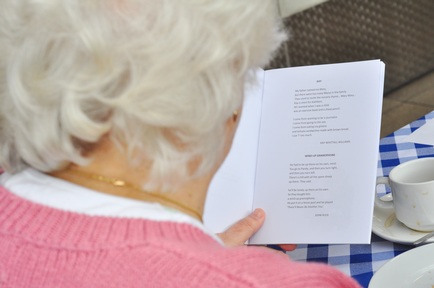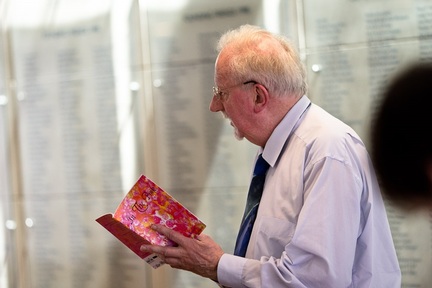Poetry Pen Pals gives voice to people living with dementia
The number of people living with dementia in the UK alone is expected to reach one million by 2025. For older people and those living with dementia, sharing poetry can improve quality of life through cognitive stimulation, social interaction and meaningful engagement.

Poetry Pen Pals began in April 2014 after the conclusion of a successful four year project ‘In the Pink’, led by world renowned dementia poet John Killick.
Developed by The Courtyard Herefordshire's Centre for the Arts, the project has delivered and exchanged monthly poetry pen pal sessions to care homes across Herefordshire with a care facility in Vancouver, Canada.
Katrin Cross, adult participation officer at The Courtyard Herefordshire's Centre for the Arts, said: “To forge a connection with others, in a time of life when people’s world (both social and physical) generally get smaller has allowed the residents’ personal life experiences to be validated.”
Exchanging poetry shares experiences
Poetry Pen Pals sessions are centred around particular themes or stimulus, including: sweet tasting, the royal family, fast cars and holidays.
Exchanging poems has enabled the residents to creatively engage and share experiences with others in the international community, including memories of the Normandy D Day Invasion.
Commenting on the shared benefits of poetry and its influence to rekindle memories, Ms Cross explained: “The Normandy D Day Invasion was a memory shared by a woman in the Canadian poetry group, who wrote a response poem about her own experience. Poetry facilitators and staff from each group indicated that this was a hugely cathartic and meaningful exchange.
“We have also received some beautiful packages filled with poems and gifts from Canada. One of the most successful was the sharing of traditional sweets. We sent bags of fizzy cola bottles, vampire teeth, foam shrimp and many more, and got a wonderful package full of candy back from our transatlantic pen pals.”
Mr Killick, a writer and researcher in the field of dementia, believes poetry is a wonderful way to connect older people and those living with dementia together; stimulating thoughts, feelings, emotions and memories.
As well as remembering their past, residents are encouraged to enjoy the literature in the present moment. The effects of shared reading in this way include an increased sense of calm, reduced agitation and increased social interaction with others who are enjoying literature in the same way.

Childhood memories inspire poems
The poems created by residents are often ones recalled from their childhood or another significant life period. Mr Killick suggests the rhyme, rhythm and compressed language of poetry helps to stimulate and maintain concentration, sparking off traces of memory.
Poetry Pen Pals was inspired by the project In the Pink. Running for four years, In the Pink took place in over 34 residencies, with 2924 residents and over 800 poems written.
During its run, Mr Killick mentored four local poets working in specialist dementia care homes in Herefordshire. As the project developed, mentoring residencies also took place in residential, day centre and acute ward settings.
The poets shared ideas with the residents, working collaboratively to form their words into poems – sometimes based on stories and memories and sometimes in response to visual stimuli such as paintings and photographs.
Ms Cross believes the process of creating poems has allowed older people to be heard and to be listened to. She added: “Writing poetry has allowed for connections to be made with other residents (sharing experiences, getting to know each other better), with care staff and with their families.
“It has also developed activity co-ordinations and care staff’s confidence to utilise poetry as a tool for creative expression and social cohesion within care homes.”
An activity co-ordinator in a care home stated: “It has brought a greater understanding of our residents, they talked about things we didn't know, formed relationships and a sense of social inclusion.”
Another said: “We have a group of residents who, following the poetry sessions, have formed a social group, sitting together at mealtimes. They would speak to each other before but just the odd comment, now they actively seek each other out.”
A resident who participated in the project commented: “It brought some variety to my life, something different that wasn’t a game. It had a process and an end result. I was able to show people about me and what I am.”
 Meaningful poetry inspires transatlantic pen pal projects
Meaningful poetry inspires transatlantic pen pal projects
Meaningful and fascinating poetry has been created from the projects, with a selection turned into books. Many of the participants who have been involved in the project have come to readings of their work at The Courtyard where an audience comprised of members of the public as well as local dignitaries. Some of the participants were able to read their own poems to the groups at their residential homes.
The Courtyard Herefordshire's Centre for the Arts is currently looking to set up a similar exchange with a group of residents receiving care in Poland.
“The formula has taken our previously successful work with poetry for older people and expanded its reach and we can’t wait to work with another group.
“We are also looking to develop a ‘how to’ guide which we will share with care homes to encourage this creative exchange process to be adopted more widely,” added Ms Cross.
A free poetry toolkit aimed at poets and care providers interested in setting up a dementia poetry project is available to download at https://www.courtyard.org.uk/get-involved/arts-and-older-people/projects/in-the-pink-the-dementia-poetry-project/
More information about the projects can be found at: www.courtyard.org.uk/aop
Latest Features News
 25-Nov-19
2019 Election: Boris Johnson leaves social care in 'too difficult box' but Labour vows to end 'crisis'
25-Nov-19
2019 Election: Boris Johnson leaves social care in 'too difficult box' but Labour vows to end 'crisis'
 18-Oct-19
Podcast: Wendy Mitchell and dementia: 'My biggest fear is not knowing who my daughters are'
18-Oct-19
Podcast: Wendy Mitchell and dementia: 'My biggest fear is not knowing who my daughters are'
 27-Sep-19
Exclusive: Care minister backs care workers' call for time off to grieve and attend funerals
27-Sep-19
Exclusive: Care minister backs care workers' call for time off to grieve and attend funerals
 19-Sep-19
Podcast: Gyles Brandreth says poetry helps ward off dementia
19-Sep-19
Podcast: Gyles Brandreth says poetry helps ward off dementia
 30-Aug-19
Edinburgh Fringe funnyman joins comics facing toughest audience at care home gig
30-Aug-19
Edinburgh Fringe funnyman joins comics facing toughest audience at care home gig